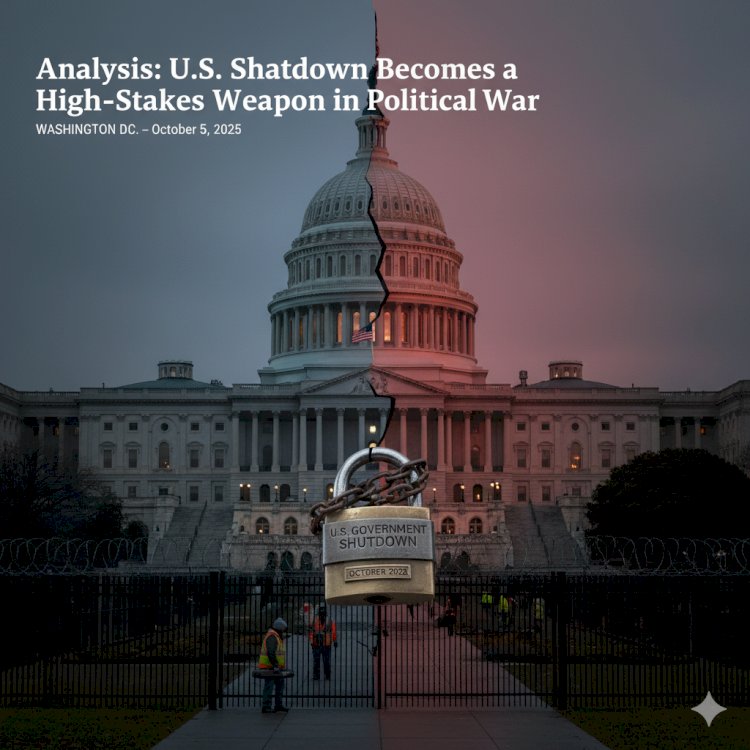Analysis: U.S. Shutdown Becomes a High-Stakes Weapon in Political War

WASHINGTON D.C. – The U.S. federal government has been paralyzed for five days by a shutdown, transforming the annual budget debate into a high-stakes, political confrontation between a Republican-controlled Congress and the White House, and a determined Democratic opposition. Unlike previous funding impasses, this shutdown is being explicitly leveraged by the executive branch to permanently reshape the federal government and intensify its political war with Democrats.
The fiscal paralysis, which began on October 1, 2025, has triggered an estimated $400 million a day in lost productivity and uncertainty for the U.S. economy, while casting a shadow of instability over international markets and diplomatic confidence.
The Health Policy Tripwire
The core dispute revolves around healthcare and government spending priorities:
-
Democratic Demand: Senate Democrats, led by Minority Leader Chuck Schumer, have unified to reject Republican short-term funding measures unless they include an extension of the enhanced Affordable Care Act (ACA) premium tax credits and a reversal of deep cuts to Medicaid that were included in a signature Republican tax and spending bill earlier this year. Democrats argue that the expiration of these subsidies will cause health insurance premiums to spike for millions of Americans.
-
Republican Stance: Republicans, controlling both chambers of Congress, are demanding a "clean" continuing resolution without the addition of any new policy provisions, accusing Democrats of using the shutdown as "hostage-taking" to force through their liberal "wish list." President Donald Trump and his administration have refused to negotiate on the health provisions, stating the issue should be handled separately.
An Escalated Threat: Layoffs and Retribution
What distinguishes this shutdown from past events is the unprecedented strategy adopted by the Trump administration, which has turned the funding lapse into an opportunity to implement its long-term goals of shrinking the federal government:
-
Permanent Layoffs: Breaking with the precedent of temporary furloughs, the White House's Office of Management and Budget (OMB) instructed agencies to prepare for mass permanent layoffs (Reductions in Force, or RIFs) in programs deemed "not consistent with the President's priorities." This threat affects hundreds of thousands of federal workers and signals the administration is willing to inflict lasting damage on the federal workforce to achieve its political aims.
-
Targeted Cuts: The administration is also actively freezing and threatening to withhold billions of dollars in congressionally approved funding for infrastructure and clean-energy projects, largely targeting states that voted Democratic in the previous election. These moves, which some legal experts view as illegal attempts at impoundment, are seen as a form of political retribution.
Impacts Beyond U.S. Borders
The shutdown’s ripple effects extend globally, weakening faith in U.S. political reliability:
-
Diplomatic and Travel Delays: U.S. embassies and consulates are operating at limited capacity, prioritizing only services for Americans in distress. Visa processing for applicants, international exchange programs, and the ability of the Department of State to engage in routine diplomatic activities face delays.
-
Economic Uncertainty: The suspension of key economic data releases from agencies like the Bureau of Labor Statistics leaves investors, global markets, and the Federal Reserve with less information to gauge the health of the world's largest economy.
-
Trade and Regulation: Regulatory enforcement slows, with delays expected for federal permits, licenses, and reviews (such as some merger reviews by the Justice Department and FTC), impacting international business transactions and trade activities.
With the 2026 midterm elections on the horizon, the political calculus is brutal: Democrats are betting that the public will blame the party in power for the disruption, while Republicans are daring the opposition to blink first, threatening ever greater consequences if the shutdown is prolonged.

 content-team
content-team 


















